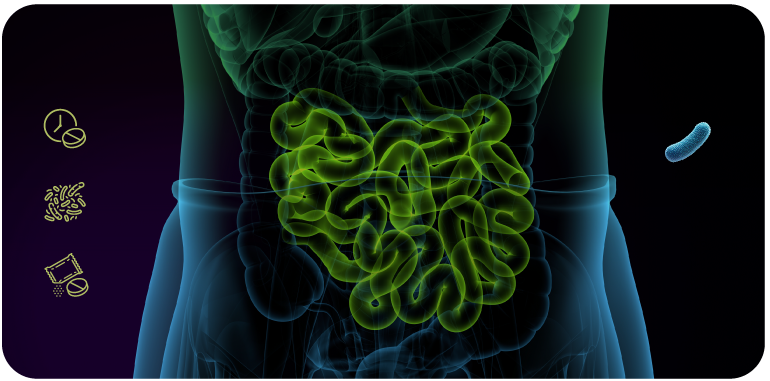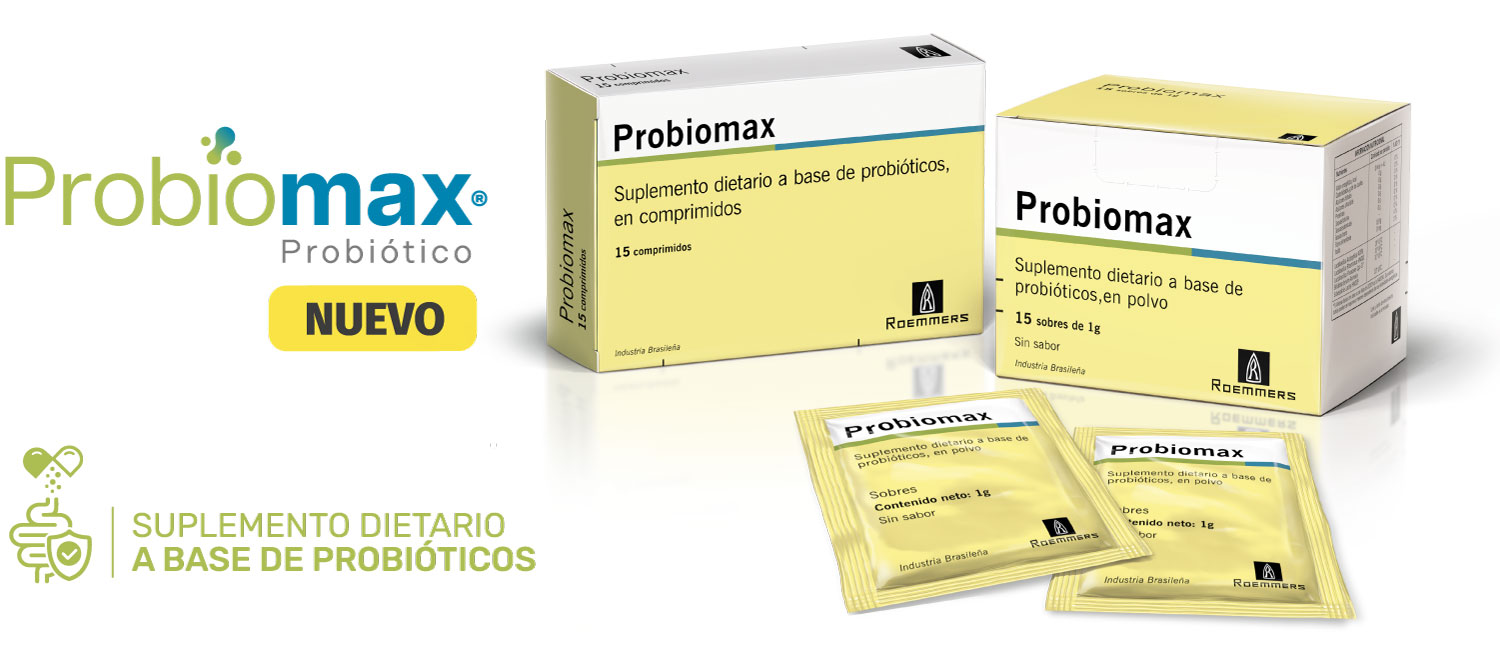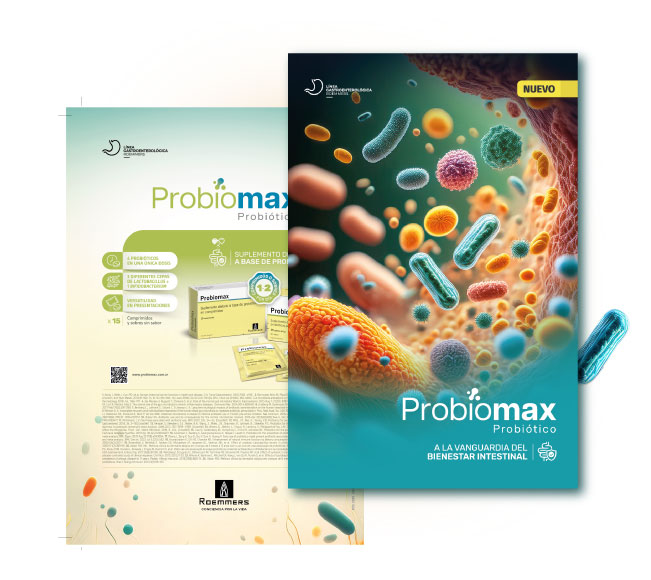
Diversos ensayos en adultos y poblaciones pediátricas han demostrado que el uso de antibióticos afecta significativamente la microbiota intestinal, reduciendo su diversidad y alterando su composición. 18-20

Ningún fármaco tiene un impacto tan marcado en la microbiota intestinal como los antibióticos, debido a su amplio uso global. Su acción dirigida contra las bacterias no solo elimina patógenos, sino que también afecta la estructura de la comunidad microbiana, moldeándola de manera considerable. 21
En los últimos años, los probióticos se han consolidado como una opción segura para reducir los efectos adversos gastrointestinales asociados al uso de antibióticos. Los generos Lactobacillus, Saccharomyces y Bifidobacterium son las más estudiadas por su capacidad para restaurar el equilibrio del microbioma. 26-27
La evidencia sugiere que los probióticos son efectivos para prevenir la diarrea asociada a los antibióticos, tanto en niños, adultos y ancianos. 28-31

18. Jernberg C., Lofmark S., Edlund C. & Jansson J. K. Long-term ecological impacts of antibiotic administration on the human intestinal microbiota. ISME J. 1, 56–66 (2007).
19. Dethlefsen L. & Relman D. A. Incomplete recovery and individualized responses of the human distal gut microbiota to repeated antibiotic perturbation. Proc. Natl Acad. Sci. USA 108, 4554–4561 (2011).
20. Korpela K, Salonen A, Virta LJ, Kekkonen RA, Forslund K, Bork P, de Vos WM. Intestinal microbiome is related to lifetime antibiotic use in Finnish pre-school children. Nat Commun. 2016 Jan 26;7:10410. doi: 10.1038/ncomms10410. PMID: 26811868; PMCID: PMC4737757.
21. Blaser MJ. Antibiotic use and its consequences for the normal microbiome. Science. 2016 Apr 29;352(6285):544-5. doi: 10.1126/science.aad9358. PMID: 27126037; PMCID: PMC4939477.
22. McFarland, L.V. Diarrhoea associated with antibiotic use. BMJ 2007, 335, 54–55. [CrossRef].
23. Milner, E.; Stevens, B.; An, M.; Lam, V.; Ainsworth, M.; Dihle, P.; Stearns, J.; Dombrowski, A.; Rego, D.; Segars, K. Utilizing Probiotics for the Prevention and Treatment of Gastrointestinal Diseases. Front. Microbiol. 2021, 12, 689958. [CrossRef] [PubMed].
24. Ianiro, G.; Tilg, H.; Gasbarrini, A. Antibiotics as deep modulators of gut microbiota: Between good and evil. Gut 2016, 65, 1906–1915. [CrossRef] [PubMed].
25. Mekonnen, S.A.; Merenstein, D.; Fraser, C.M.; Marco, M.L. Molecular mechanisms of probiotic prevention of antibiotic-associated diarrhea. Curr. Opin. Biotechnol. 2020, 61, 226–234. [CrossRef] [PubMed].
26,Mills, J.P.; Rao, K.; Young, V.B. Probiotics for prevention of Clostridium difficile infection. Curr. Opin. Gastroenterol. 2018, 34, 3–10.[CrossRef]
27. Hempel, S.; Newberry, S.J.; Maher, A.R.; Wang, Z.; Miles, J.N.; Shanman, R.; Johnsen, B.; Shekelle, P.G. Probiotics for the prevention and treatment of antibiotic-associated diarrhea: A systematic review and meta-analysis. JAMA 2012, 307, 1959–1969. [CrossRef].
28. Wieers, G.; Belkhir, L.; Enaud, R.; Leclercq, S.; Philippart de Foy, J.M.; Dequenne, I.; de Timary, P.; Cani, P.D. How Probiotics Affect the Microbiota. Front. Cell. Infect. Microbiol. 2019, 9, 454. [CrossRef].
29. Guo Q, Goldenberg JZ, Humphrey C, El Dib R, Johnston BC. Probiotics for the prevention of pediatric antibiotic-associated diarrhea. Cochrane Database Syst Rev. 2019 Apr 30;4(4):CD004827.
30. Goodman C, Keating G, Georgousopoulou E, Hespe C, Levett K. Probiotics for the prevention of antibiotic-associated diarrhoea: a systematic review and meta-analysis. BMJ Open. 2021 Aug 12;11(8):e043054.
31. Zhang L, Zeng X, Guo D, Zou Y, Gan H, Huang X. Early use of probiotics might prevent antibiotic-associated diarrhea in elderly (>65 years): a systematic review and meta-analysis. BMC Geriatr. 2022 Jul 6;22(1):562.

Preguntas Frecuentes
• Lactobacillus acidophilus NCFM
• Lactobacillus rhamnosus HN001
• Lactobacillus paracasei LPC-37
• Bifidobacterium animalis subespecie lactis HN019
Estas cepas han sido seleccionadas por su efectividad y seguridad en el equilibrio del microbioma intestinal.
Polvo: Disolver el contenido de 1 sobre en un vaso de agua (100 ml) y agitar vigorosamente. Consumir inmediatamente después de preparado. Dosis diaria recomendada: 1 a 2 sobres.
Ante cualquier duda sobre la dosificación o la duración del uso, consulte a su médico.


